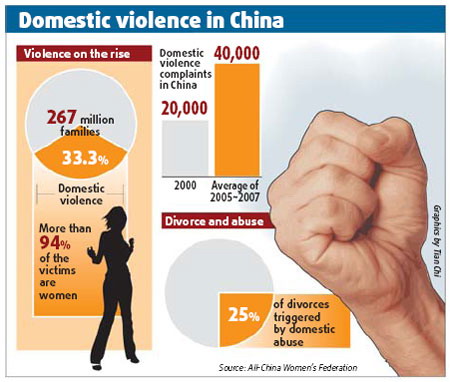
|
CHINA> National
 |
|
Pulling no punches against domestic abuse
By Wang Ying (China Daily)
Updated: 2008-11-25 07:46  Chen Benjian, director of China Law Society's Center for Combating Domestic Violence, agrees: "Above all, we need an anti-domestic violence law that experts have been seeking for more than five years." "Studies show domestic violence, physical and mental alike, can take place in families of any social class," Chen says. "Living without violence is the right of every family member. Community intervention can greatly help reduce such violence," Chen says. Organizations and research institutes such as the Maple center and the Legal Center of Peking University, too, have sought laws to protect victims of domestic violence. Maple center director Hou says she expects legal steps to be taken across the country to remove wife-abusers from the family and to re-educate them. Seven State agencies, including the ministries of public security, justice, civil affairs and health, issued a joint statement last month urging policemen answering calls on the hotline (110) to respond to domestic violence complaints. But even though the criminal law does not exclude private matters, police are reluctant to deal with "family affairs", China Politics and Law University professor Xia Yinlan says. Police start investigating a domestic violence case only after someone is killed or seriously injured. "That only brings perpetrators of crime to justice but does not help prevent such incidents it does not protect the victims' rights or interests, either." Though police in Liaoning province began responding to complaints against domestic violence four years ago, such interventions can only deal with emergency situations and cannot be the final solution. What makes matters complicated is that prosecutors in some cities regard "wife-beating" as a private matter. Even the Beijing procuratorate introduced a rule in 2002 to exclude "light injuries" cases, including domestic violence, to cut costs. The first legal definition of domestic violence came as late as in 2001, when the revised Marriage Law defined it as "an act involving beating, tying-up, mutilation and forced restriction of personal freedom, which causes a family member physical or mental harm". But even that is "far from perfect because it lacks clarity on enforcement", Xia says. Since there is no specific law on domestic violence, such cases are dealt with under broader women's rights and anti-violence legislation such as the 1992 Law on the Protection of Rights and Interests of Women and the criminal law that covers deliberate injury caused within families, which carry less harsh punishment. "A combination of a bias against domestic violence and weak law enforcement have forced victims to sometimes turn to desperate measures," says researcher Chen Min of the Supreme People's Court. More than half of the women imprisoned in recent years are victims of domestic violence who took revenge on their abusers. In the 1970s, American forensic psychologist Lenore Walker coined the phrase "battered woman's syndrome" to explain the extreme behavior women who suffered from long-term violence took against their abusers. Battered woman's syndrome has been used as a defense for women charged with murder for killing their abusers. Although Chinese law acknowledges the right of self-defense, it does not consider the psychological state of battered women. As a result some of the battered women who killed their male abusers have been treated like common criminals and charged with murder, Chen Min says. But despite not having a specific law on domestic violence China has taken strides, especially after the 1995 Fourth World Conference on Women in Beijing, to protect domestic violence victims. Twenty-five provinces, autonomous regions and municipalities have already introduced anti-domestic violence regulations, largely because of the efforts of local women's NGOs and women's federations. Apart from that, several civil affairs departments have set up shelters for women, and some women's organizations and health departments have jointly set up domestic violence injury identification centers. "Elimination of domestic violence requires the efforts of the whole of society," Chen Benjian says. "We need to establish a set of effective measures to curb domestic violence so that the perpetrators are punished From a social and cultural perspective, we have to build gender equality and make domestic abuse socially unacceptable. Above all, women have to learn to say 'No' (to violence) bravely." That is exactly what Maple center's counselor Xie Hua has told Li Li. When Li said, "Sometimes I hate myself for being such a coward but I dare not defend myself for fear of inviting more trouble", Xie told her that "too much tolerance and too many concessions sometimes invite more violence". After talking with Xie, Li has promised to defend herself and seek community help if her husband beats her again. |
最新中文字幕av无码专区| 国产V亚洲V天堂A无码| 国产精品午夜福利在线无码 | 精品人无码一区二区三区| 最近中文字幕免费2019| 永久免费无码网站在线观看个| 一本大道东京热无码一区| 亚洲久本草在线中文字幕| 亚洲高清无码专区视频| 99久久无码一区人妻a黑| 小13箩利洗澡无码视频网站 | 一本大道东京热无码一区| 国产欧美日韩中文字幕 | 午夜视频在线观看www中文| 西西4444www大胆无码| 久久精品国产亚洲AV无码偷窥 | 日韩AV无码精品人妻系列| 久久亚洲精品无码aⅴ大香| 日本中文字幕网站| 天堂网www中文在线| 亚洲AV蜜桃永久无码精品| 国产成A人亚洲精V品无码| 色窝窝无码一区二区三区成人网站| 精品欧洲av无码一区二区14| 亚洲精品人成无码中文毛片 | 亚洲精品97久久中文字幕无码 | 日韩人妻无码一区二区三区综合部| 最近免费2019中文字幕大全| 一区二区中文字幕| 国产中文字幕在线视频| 精品亚洲欧美中文字幕在线看 | 中文字幕在线看日本大片| 日本高清免费中文在线看| 欧美成人中文字幕在线看| 亚洲欧美成人久久综合中文网| 亚洲福利中文字幕在线网址| 中文字幕日韩欧美一区二区| 亚洲中文字幕无码久久精品1| 无码h黄动漫在线播放网站| 蜜芽亚洲av无码精品色午夜| heyzo专区无码综合|